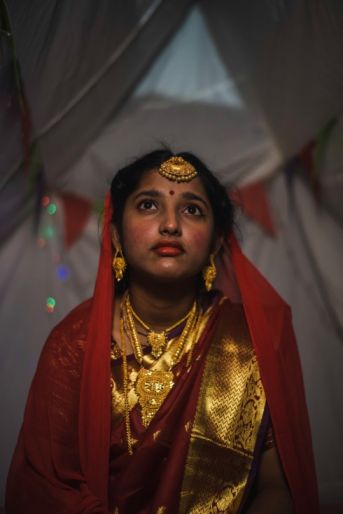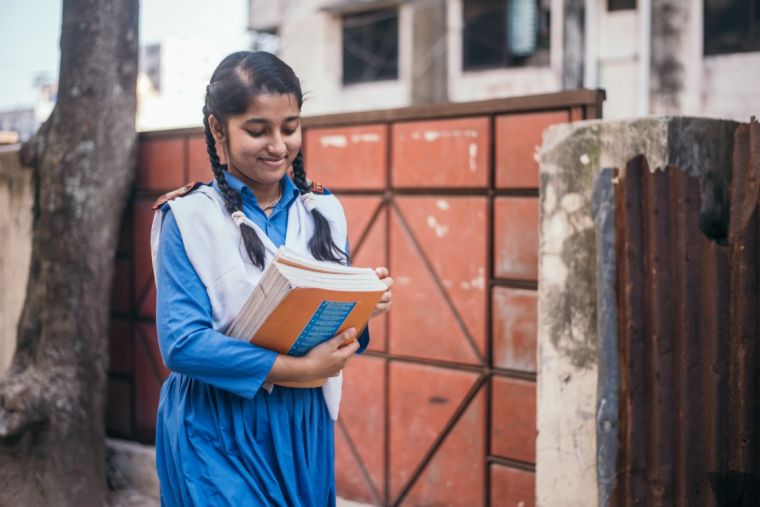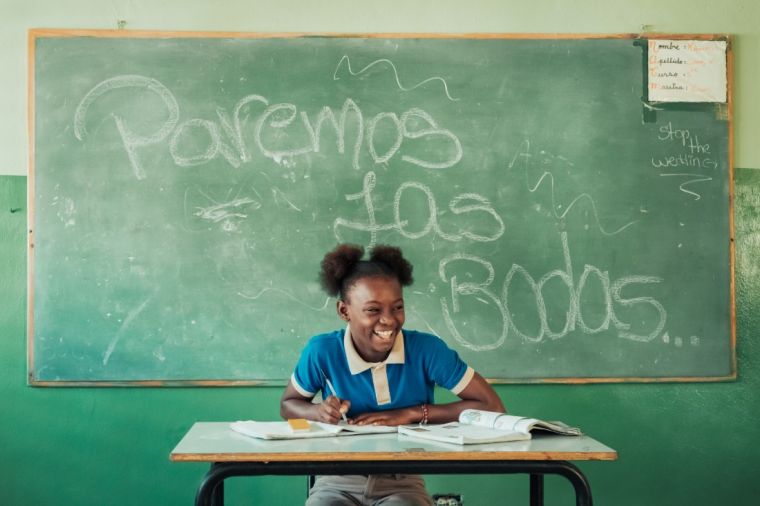Child marriage and the race to stop 'I do'

Up to 10 million more girls will be at risk of child marriage over the next decade because of the COVID-19 pandemic. To raise awareness, four teenage girls from different countries dressed in bridal finery in a staged wedding to boldly proclaim the dangers of child marriage. Learn why and how to prevent girls like them from saying, 'I do', too soon.
Tisha gazes blankly at the camera with kohl-lined eyes. She is veiled in silken red fabric and festooned with golden jewelry. Her lips are painted red, her young cheeks a delicate pink. Her skirt trails clumsily after her. It's too long. It was made for an older woman.
Tisha is 14 years old, and this is a wedding shoot.
Staring down the barrel of the camera, she boldly proclaims a short phrase in Bengali.
"Stop the wedding."
Child marriage—marriage before the age of 18, including informal unions—is a violation of children's rights. Despite being illegal in many countries, it remains widespread. Alarmingly, the effects of the Covid-19 pandemic are predicted to turbo-charge the harmful practice, putting 10 million more girls at risk over the next decade.
"Child marriage creates a nightmarish legal trap for children," says Fraidy Reiss, founder of advocacy organization Unchained at Last. "They can be entered into the marriage by parents and/or a judge, with little or no input from them."
In Bangladesh, 15% of girls are already married by age 15, more than 50% by 18 years old. Despite appearances, Tisha is not one of them. Several of her friends are already wed, though.
"When I walk past their homes carrying books and a school bag, it hurts me to see girls my age instead washing dishes and providing service for their in-laws," she says.
It's why she agreed to participate in a staged wedding photoshoot for Compassion. Along with Yolane, 14, in Brazil, and 13-year-olds Lauri from the Dominican Republic and Mart in Ethiopia, she dressed in bridal finery to boldly proclaim the dangers of child marriage.
"No teenagers should get married," says Tisha, passionately. "When someone has so much scope in life and so many things to do in the future, why sacrifice that? Marriage is not the solution to life's problems."
A generation of child brides
The pandemic is increasing the risk of child marriage in several ways. Education is proven to prevent early marriage, with each year of secondary school reducing a girl's likelihood of marrying before age 18. Yet school closures triggered by Covid-19 may cause girls to drop out entirely or be less likely to re-enrol.
"Covid has created a situation where we know that millions of children will not go back to school," says Sidney Muisyo, Chief Program Officer for Compassion International. "Every girl who gets educated delays marriage and delays bearing children. The health of the mother, the health of the children and the health of the family is impacted for years to come, simply because of an early marriage."
Along with school closures, the pandemic has isolated children from social services. Already vulnerable girls have been cut off from teachers, health professionals, the justice system, and other services that can recognise and support a girl in crisis.
Finally, the pandemic has plunged families into desperate poverty. They were poor before. They are poorer now.
"When a family is struggling with the basic necessities of life, like food, any child is an extra mouth to feed," says Sidney Muisyo, "and if a girl can get married, that is one less mouth they have to worry about."
In Brazil, 14-year-old Yolane leans against her simple mud home. She's dressed in a sagging satin wedding gown and is the same age her sister was when she chose to wed.
"First, she left home to live with her boyfriend," says Yolane. "That's how it happens most of the time here." A year later, her sister fell pregnant.
"A lot of parents encourage girls to marry because girls are seen as a burden at home," she says.
"That's not right."
For parents, it can be a complex and heartbreaking decision. Some feel forced to choose between their daughter's future and their family's survival; others believe she will be better off as a bride.
Through awareness campaigns, Compassion's partners all over the world are helping to prevent countless early marriages. Yet despite their best efforts, there are still a small number of children who depart the program early to be wed. Of this number, the overwhelming majority are girls.

"When a man approaches [their daughter] with a promise of a better life and financial security," says Letera, a Compassion centre director in Ethiopia, "they get married even if they are still children."
A marriage to hardship and hard labour
Tisha, Yolane, Lauri, and Mart look beautiful—if alarmingly young—in their wedding finery. The reality for young brides is far less glamorous. For girls living in poverty, there is often no ceremony or festivities at all, and "the fairy tale they imagined soon crumbles," says Compassion tutor Claudeane in Brazil.
Child marriage denies girls the opportunity to develop their full potential. They are not only robbed of their childhood but are often socially isolated. Taken out of school, separated from family and friends, they assume responsibilities they are too young for.
"It is basically a marriage to hardship and to hard labour," says Sidney Muisyo.
In contrast, 13-year-old Lauri swings a hula hoop as her friends joyfully cheer her on. It's starkly different to the scene just hours ago, when Lauri stood stiffly in white lace. She says she won't consider marriage until after she has conquered her dreams.
"A girl who gets married young must drop out of school, dedicate themselves to cleaning the house, and take care of a child and a man that she doesn't understand," she says. "Instead of moving forward, it is like her life has frozen."
Once married, the pressure to become pregnant can be intense, even though girls' young bodies are not always ready to give birth. "A girl is not prepared physically or mentally to assume the role of a grown up," says Lauri.
In Ethiopia, Mart stares into a shard of broken mirror. The teenager looking back at her, dressed in richly embroidered robes, reflects a sombre alternative reality - 40% of Ethiopian girls are married by 18.
"Girls should be in school," she says firmly. "They should be allowed to pursue their education and become who God wants them to be. Everything is good when it is done in its own appropriate time."
Since poverty is one of the leading drivers of child marriage, it mainly occurs in lower-income countries. Bangladesh, Ethiopia and Brazil are amongst the five countries that account for about half of the 650 million child marriages globally. But girls in higher-income nations are at risk, too. The practice continues to take place across the world, including in the UK. Recorded cases are likely to be only a fraction of the number of unreported cases. As many unions take place in religious ceremonies that aren't formalised, it is difficult to capture the true number of child brides both here in the UK and around the world.
Join the young advocates
"There's a time for everything," says Lauri. "Our age is the time to mature, play, grow, learn, and develop our skills and minds to build a future where we can handle responsibilities like marriage."

Compassion centres across the world are stepping up to support the girls in their fight. In the Dominican Republic, centre staff have increased their counselling efforts with girls and their families. In Ethiopia, guest speakers answer parents' questions. A girls' club in Brazil prepares teenagers for the joy and challenges of womanhood. In Bangladesh, parents and children gather at the centre in small groups to discuss the dangers of child marriage.
"Our role is to be there to encourage their dreams and show them a new path," explains tutor Claudeane in Brazil. In Ethiopia, centre director Letera agrees. "We need to emphasize that girls are not the property of the husbands or their parents but are change-makers," she says. "Girls can be wives, mothers, and productive members of society who can contribute to the development of their country."
Lauri intends to become a paediatrician, Tisha a doctor. Yolane plans to build a two-floor home for her family—with a pool in the backyard. (She helped build their current mud home.) With quiet determination, Mart says, "My dream is to pursue my education and bring my family out of poverty."
Back at home, Tisha swaps the scarlet and gold sari for her neat blue uniform. She enjoyed wearing the beautiful clothes for a day. But this dress feels much more comfortable.
Shrugging on her backpack, she heads to school.
While the situation facing 10 million young girls is desperate, it is not definite.
At a grassroots level girls like Tisha, Yolane, Lauri and Mart are sharing their powerful message. Child marriage must be stopped. It is a message that we need to stand with them to proclaim – to join them in the race to stop 'I do'.
For more information about how you can help Stop The Weddings, go to www.compassionuk.org or follow them on social media @CompassionUK











